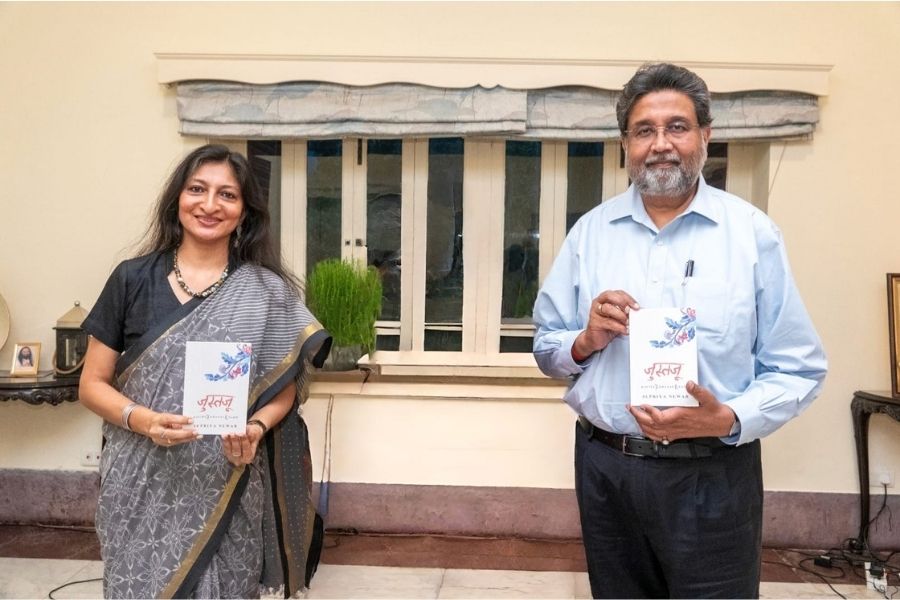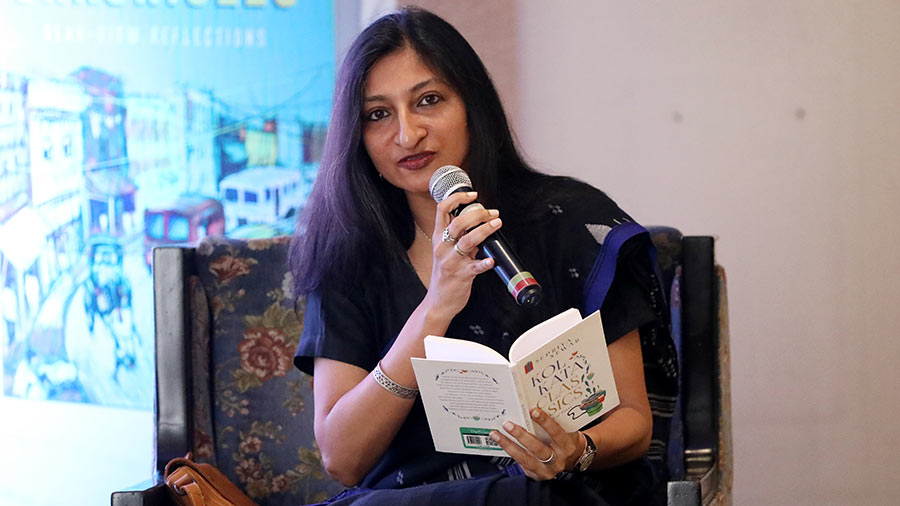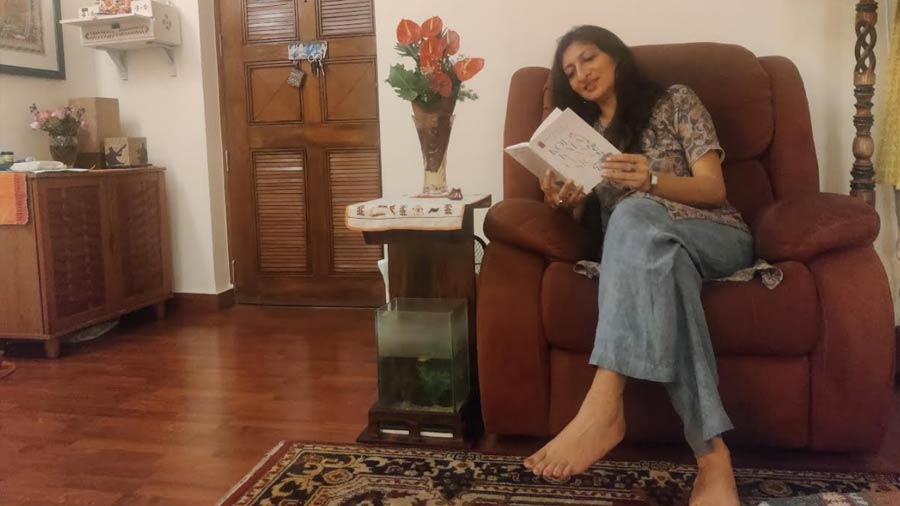Many define poetry as the union of language, thought, and emotion. But for author Supriya Newar, it is also a homecoming. While her new book, Justaju, marks her debut in Hindustani poetry, her tryst with the language has been a lifelong one. The book’s title, meaning ‘quest,’ reflects her own literary journey — one that began in childhood, meandered through English writing, and is now rooted in the lyrical beauty of Hindustani verse. My Kolkata caught up with Newar over a cup of tea to discuss how this quest came to fruition.
A childhood obsession
The journey began when she was a young girl. “My father had a fondness for poetry," Newar reminisces, adding, “Every morning, while dropping us to school, he would recite dohas and chaupais. Before I read Kabir, Rahim, or Tulsidas in school, they were already a part of me.”
While studying at Modern High School for Girls, one of Kolkata’s premier institutions, much of her foundational writing was in English, but her soul still craved Indian poetry. “While the craft of English poetry appealed a lot to me, there’s only so much you can appreciate about daffodils without having seen one in real life! The poets of our country always resonated with me more because I could feel and relate to their context."
As a teenager, this love extended to Indian music, anchored by her training in Hindustani classical and a household filled with the sounds of ghazals. This was the pre-Internet era, and Newar quenched her thirst for the language by picking up an Urdu Lughat (Urdu-to-Urdu dictionary), along with several Urdu-to-English dictionaries. “I am conversant in five languages, but even back then, nothing sounded as beautiful as Hindustani Urdu.”
Back to roots
Despite this early connection, life and work took her in a different direction. She began writing articles and travelogues for various publications before moving into the corporate world. More recently, she received acclaim for her books on Kolkata — Kalkatta Chronicles and Kolkata Classics. But, despite her growing repertoire in English, the love for Urdu-Hindustani poetry never left.
“While I wrote professionally in English, I was always writing poetry in Hindustani for myself. Besides this, I would occasionally help people informally with Hindi writing. But the beauty, cadence and sheer poetry of this language was such that a book was waiting to happen,” Newar smiles.
During the Covid lockdown, when the world was at a standstill, her thoughts were louder than ever. She penned the first poem of the series, Auqaat, examining the narcissism with which humans assume ownership over the planet. The experience was so cathartic that she kept writing, and soon, Chauka was born. The longest piece in her collection, this poem captures the aura of an Indian kitchen and was written in one go.
“I am generally consumed by an idea or thought for days before I write it as poetry. Chauka must have been brewing within me for months, if not years. It felt like someone was dictating the entire poem to me, and upon completion, I felt this overwhelming liberation. It was like a justaju (quest) for me,” she reminisces.
Soon, she had completed her third poem, Somvaar. “I shared it with my editor from Readomania, who published my Kolkata books. She loved it so much that she asked me to share more of my collection.” Newar decided to push herself to write 40 poems with a singular focus — poems that would be gentle in their content while leaving space for thought. The result was a collection of ghazals, nazms and kavitas. “The sound, beauty, and phonetics of this language had affected me deeply my whole life. I knew I had to attempt this,” she says.
The quest behind ‘Justaju’
The objective behind her journey into Hindustani poetry was not just linguistic, but also philosophical. “For me, a good poem needs to touch the heart, but also stir the mind. It must move you, but also make you think. In today’s age of 24x7 content, making even two lines linger in someone’s memory is no small feat.”
Newar’s goal was to create something layered yet accessible. She calls out the flaws in how language is taught, where people are raised to appreciate writing that is difficult to understand. “We were taught that someone who uses big, difficult words has a good command over language. But that can’t be true, because the fundamental function of language is to build bridges, not create barriers.”
Understanding the contemporary reader’s engagement with language, Newar included Roman transliterations alongside the Devanagari script for every poem in the book. "Today, so much of our Hindi is also written in English, thanks to WhatsApp. Many people simply can’t read Hindi in Devanagari, but why shouldn’t they be able to enjoy Hindi poetry?” The decision has made the book accessible to an even wider audience.
At the same time, she feels there is a difference between overly simplistic writing and solid craft. To Newar, poetry can’t read like a news report — it is more like cooking. “A robust vocabulary is like having a well-stocked kitchen. But a great dish isn’t about using every spice — it’s about knowing which ones to use, and in what measure. Agar namak bilkul bhi na ho, toh phika lagega hi. Simply having a good thought isn’t enough. You also have to say it well.”
The transition from English to Hindustani poetry, though organic, required commitment. Like most Indians, Newar thinks in multiple languages. However, the only way to do justice to her book was to completely submit to one language. “While writing this book, I made a deliberate choice — not to write a single line in English. The environment around us is so dominated by English that I had to consciously switch my mental framework. For eight months, between 2023 and 2024, apart from WhatsApp messages and emails, I wrote solely in Hindustani.”
Newar wants her audience to approach poetry with a similar commitment. While accessibility is important, she also believes sincerity allows a reader to get more out of a poem. This is also reflected in the book’s title, Justaju. “I didn’t want an easy, low-hanging Urdu word that has been overused. Every poem in this collection is born from a sense of search. I wanted the title to create intrigue, hinting at what readers can expect,” she explains.
The themes in the book stem from Newar’s personal experiences. She confesses that she can’t create poetry unless something affects her deeply. “Most poetry is about the things you aren’t ready for — the surprises of life, the disappointments, the joys, and life itself.”
After labouring over her craft for the better part of a year, Justaju finally made its way to bookstores and Amazon last August. In a short span of time, the book has won over both poetry lovers and stalwarts. Apart from being launched by industrialist Harshavardhan Neotia, Justaju received endorsements from many eminent patrons of arts and culture, including celebrated thespian Atul Satya Kaushik, Sahitya Akademi-awardee Alka Saraogi, and ghazal singer and academic Radhika Chopra. Newar also finds herself frequently asked to recite lines from Chauka wherever she goes. “This book is like parallel cinema — it has a niche audience — but I had to put it out for the love I hold for this language. It was like a baby I needed to birth.”
It is this adoration from readers that makes the process of writing worthwhile. For Newar, the most satisfying moment as a poet is reading her poetry to an audience and finding them completely immersed. “In that moment, they are not doctors or engineers or bankers — they are simply lovers of poetry,” she beams.
As she basks in the acclaim, Newar remains committed to her craft. Her goal is to keep writing. "Since 2016, I’ve had a new book out every year. If Ma Saraswati is kind, this year will be no different.” Whether it’s another poetry collection or an entirely new premise, one thing is certain — her own justaju is far from over.


